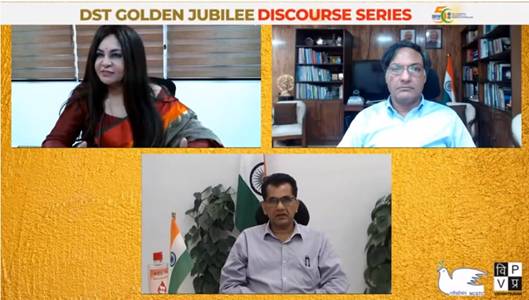Dignitaries underscored the necessity of focusing on sunrise sectors for future growth and development in a post COVID world, and this only science and technology will be able to do, at an online discourse titled ‘On the Other Side of the Pandemic…A Science Policy Interface’.
“COVID-19 has destroyed normal life and disrupted economic activities, but it is also a huge opportunity of hope, change and promise of a better future. This can only be tackled by science and technology which will be the key for the future— be it remote health care or telemedicine or quality healthcare for remote villages or online education or any other thing.”, said NITI Aayog CEO Amitabh Kant, urging people to follow appropriate COVID-19 protocols and vaccinate themselves.
He added that scientific areas like genome sequencing is very important in the age of pandemic and will provide solutions to many problems, including the pandemic COVID-19. 5G technology will rapidly transform the world of technology and mobile technology for faster communication. Similarly, Artificial Intelligence (AI) has the potential to boost India’s growth.
Mr Amitabh Kant was speaking online at the DST Golden Jubilee Discourse Series programme on the topic jointly organized by National Council for Science & Technology Communication and Vigyan Prasar.
At the programme, Secretary Department of Science and Technology (DST) Prof Ashutosh Sharma talked about DST’s efforts in the last 50 years and, in particular, the work done during the last one year during the pandemic COVID-19 that has helped strengthen science and technology infrastructure in the country. He stressed on the four policies that DST had worked on, including the upcoming Science, Technology and Innovation Policy 2021 (STIP), the liberalized geospatial data policy and the upcoming Scientific Social Responsibility (SSR), which will empower the society. He also highlighted DST’s contributions in the fight against the pandemic COVID-19. He elaborated on DST’s initiatives to tackle the gender gap in science and technology and said that the Cyber-Physical System (CPS) with 25 hubs and industry, academia and startups working together will have an impact on everything – from education, decision-making to economy.
“Talking about COVID-19 2.0, the DST Secretary added, “COVID-19 mutations will keep on happening in future, and we will keep on analyzing mutations and impact on health with speed and scale. At the same time, we will be able to control the transmission of virus only by not allowing transmission of the virus through following appropriate COVID-19 protocol,” Professor Sharma added.
He also elaborated on the new initiative NIDHI4COVID2.0 that has been launched as a rapid response to support startup-driven solutions for tackling the current challenging second wave of COVID 2.0 in the country. Under this programme, Indian startups and companies have been invited to apply for developing new technologies and innovative products that can enable our country to fight the crisis.
“While in the first COVID-19 wave, we started getting results from 100 startups supported in 3-4 months, under this new initiative to fight the pandemic, we have identified companies, and positive results are coming within a month. With our own technology, we can do lots. We can develop global quality of oxygen concentrators at two-thirds price. This could generate huge opportunities for the development and manufacturing of several critical components that are being imported, such as specialized valves, zeolite materials, oil-less and noiseless miniaturized compressors, gas sensors, and so on which have wider applications in several sectors,” the DST Secretary explained.

******
SS/RP/(DST Media Cell)
(Release ID: 1722184)
Visitor Counter : 2
